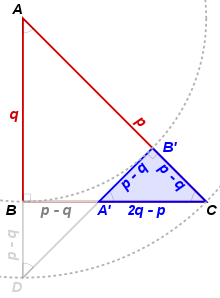
In mathematics, an existence theorem is a theorem which asserts the existence of a certain object.[1] It might be a statement which begins with the phrase "there exist(s)", or it might be a universal statement whose last quantifier is existential (e.g., "for all x, y, ... there exist(s) ..."). In the formal terms of symbolic logic, an existence theorem is a theorem with a prenex normal form involving the existential quantifier, even though in practice, such theorems are usually stated in standard mathematical language. For example, the statement that the sine function is continuous everywhere, or any theorem written in big O notation, can be considered as theorems which are existential by nature—since the quantification can be found in the definitions of the concepts used.
A controversy that goes back to the early twentieth century concerns the issue of purely theoretic existence theorems, that is, theorems which depend on non-constructive foundational material such as the axiom of infinity, the axiom of choice or the law of excluded middle. Such theorems provide no indication as to how to construct (or exhibit) the object whose existence is being claimed. From a constructivist viewpoint, such approaches are not viable as it leads to mathematics losing its concrete applicability,[2] while the opposing viewpoint is that abstract methods are far-reaching,[further explanation needed] in a way that numerical analysis cannot be.
- ^ "Definition of existence theorem | Dictionary.com". www.dictionary.com. Retrieved 2019-11-29.
- ^ See the section on nonconstructive proofs of the entry "Constructive proof".